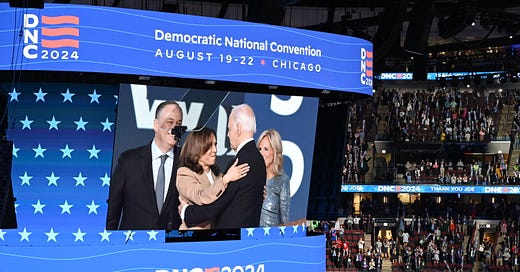
Democrats In Array
The only fireworks at the Democratic convention so far have been the feel-good variety.
The official delegate roll-call to nominate a presidential candidate is usually one of the more boring parts of a convention to watch, so the DNC party-planners’ decision to score each delegation’s mini-monologues with state-specific hype music was an inspired one.
We’d say the GOP should adopt the same strategy going forward, but we don’t know if we could handle that much Kid Rock. Happy Wednesday.
This Ain’t Chicago ’68
—Andrew Egger
We don’t know yet whether Kamala Harris and company will ride out of this week with the traditional post-convention polling surge—after all, parties don’t usually ride into their conventions on the heels of a race-resetting, vibe-unleashing change to the top of the ticket. But here’s what we can say: Two days in, the Democrats are undoubtedly putting on the kind of high-energy, focused, and above all unified show that good polling tends to follow.
Going in, that was hardly a given. For months, as progressive anger against Joe Biden’s support for Israel’s war against Hamas simmered, the convention’s chosen city of Chicago drew nervous comparisons to the riot-marred Democratic convention in the same city in 1968. And then, of course, Biden was compelled to withdraw—raising the possibility of a wide-open nominating fight that could thrust the party into fierce disagreement just as voters were tuning in.
But not only have expected external protests largely fizzled—Democrats inside the room have been remarkably united too.
Eight years ago, delegates supporting Bernie Sanders put up a memorable floor fight against the DNC for putting a thumb on the scales in favor of Hillary Clinton. The publication of hacked committee emails online ended up forcing the resignation of DNC chair Debbie Wasserman Schultz.
Four years later, progressive star Alexandria Ocasio-Cortez spoke for only 90 seconds in the symbolic role of putting Sanders’s name forward for nomination again. It was widely perceived as a bit of a snub.
This time around, both luminaries of the formerly dissident left have played central roles in the convention programming—Ocasio-Cortez on Monday, Sanders last night—praising Harris and warning of the dangers of a second Donald Trump term.
The result so far has been a convention that’s kept the spotlight on its juggernauts, with no internal bickering to distract from—for instance—last night’s one-two-three punch of Doug Emhoff and Michelle and Barack Obama.
There’s lots of reasons why Democrats have been able to pull off the show of unity this time around. Having a candidate with enormous momentum obviously helps, as does the cosmic task of opposing Trump.
But we shouldn’t lose sight of another, perhaps underrated reason: Democrats are this united today because Biden spent his first term doing the patient coalition-tending work of getting them united.
During his 2020 campaign, Biden easily dismissed Trump’s claims that he was beholden to his dissident left flank. “Your party wants to go socialist medicine,” Trump bellowed during one debate. “They’re going to dominate you, Joe, you know that.”
“The party is me,” Biden replied. “Right now, I am the Democratic party.”
It was true: Biden never endorsed many progressive priorities, from Medicare for All to the end of the Senate filibuster. But he also didn’t spend his time in office beating up on the Sanders coalition to burnish his moderate bona fides. Instead, he brought them into his tent: ensuring they had a seat at the table in legislative negotiations while drawing on their brain trust as he rolled out his own unexpectedly populist and antitrust-heavy agenda.
The work Biden did to heal the Democratic party’s internal divisions was evident as he was being pushed towards the exits. Ocasio-Cortez was one of the more vocal lawmakers calling for him to remain. Sanders went on a media blitz demanding the same. But when it was clear that the pressure for Biden to go wouldn’t subside, that same unity he created proved invaluable—allowing Democrats to move with little turbulence through a complicated transition.
It must be a bittersweet sight for the president to watch his party enjoy the harmonious fruits of his coalition-building labors in Chicago—from D.C.
But consider the opposite approach. Like Biden, Trump has reshaped his party; unlike Biden, he has done this not through even-keeled diplomacy but through personal domination, exiling from the party any who oppose him, keeping his ungainly coalition together through sheer force of personality. That’s good for Trump’s short-term political survival. It’s not so good for his party’s chances of transitioning away from him smoothly when he’s finally in the rearview mirror. How many years will it take after Trump for Republicans to coalesce as neatly around their next leader as Democrats have done in a month?
A Functioning Party
—William Kristol
I agree with Andrew that the Chicago convention suggests the Democrats are in pretty good shape. Let me just extend the point for a minute.
What we saw last night in Chicago was a healthy political party. Which is a good thing, and an important one. Healthy political parties make effective governance in modern democracies possible. Healthy political parties make a decently functional political system possible.
What we saw at the Republican convention last month, by contrast, was a weird cult of personality, a crowd in thrall to a demagogue. It was something dangerous, something to be resisted.
As Edmund Burke, the founder of modern party government, explained, “When bad men combine, the good must associate; else they will fall, one by one, an unpitied sacrifice in a contemptible struggle.”
Demagogues will find ways to combine men in the service of bad causes. The associations that resist them can be temporary, designed for a period of crisis or a moment of decision.But there should also be associations that exist beyond crises, that last and help organize the citizenry over the longer term. There should be a lasting organization that can guide a nation along a reasonable path, an organization that’s grounded in certain principles but also flexible, open to modification and change. That’s a political party.
It’s not too much to hope that what we’ve seen over the last couple of days in Chicago is a sound political party capable of governing. This new Democratic party is ideologically broad, stretching from AOC to career conservatives. It’s got a history: the Clintons and the Obamas, and soon Joe Biden. And it’s got a present: the Harris-Walz ticket. And it has a promising future, embodied in so many impressive younger elected officials at the federal and state levels.
A successful political party will be a big tent. And that’s a political advantage. Different groups—different voters—can find different political leaders they admire and want to associate with. There can be Clinton Democrats and Obama Democrats, Bernie followers and ex-Republican McCain admirers, people who think the future is embodied by AOC and voters who’d prefer a path charted by Mikie Sherrill and Abigail Spanberger.
But a successful party isn’t simply a tent that provides shelter and comfort to disparate groups. It also has enough of a common purpose to make its individuals feel they’re part of a whole, part of a larger effort working together in a common cause.
The immediate cause is the important one of defeating Donald Trump. But that’s in the service of a broader cause of defending a free society, a self-governing nation, a liberal order in the broad sense that provides room for the conservative and progressive spirits alike.
Such a party can both look back and drive forward. It can be focused and committed. But it can also be fun: The roll call of the states! Funny hats! Cheeseheads!
Some commentators have hoped that the Harris candidacy is on the verge of becoming something more powerful than a campaign, a “movement.” I understand the wish, but I’m wary of an embrace of “movements.” Movements can be necessary and admirable—the civil rights movement for example. But good movements are hard to sustain, and bad ones can arise to bolster demagogues.
A sound political party is what we need. It’s more than an individual campaign. But it’s less than an all-encompassing movement. It’s consistent with the purposes and limits of political action in a free society.
I’m heartened that we may be seeing in Chicago a healthy and functional political party. Perhaps one day we’ll have two of them.
Quick Hits
THE NON-PROS STEAL THE SHOW: Sam Stein notes for the site this morning that Harris’s most persuasive shows of support at the DNC so far have come from Doug Emhoff and Michelle Obama, two Democrats who have never held political office: “Both did something that the first night’s speakers failed to truly accomplish,” Sam writes. “They painted a human portrait of Harris for an electorate still learning about her, then laid out the game plan for the sprint ahead.”
TIPPING THEIR HAND: The likeliest outcome of Robert F. Kennedy Jr.’s presidential bid has always been him re-joining forces with Trump, and Kennedy’s running mate Nicole Shanahan admitted that they’re actively considering that approach yesterday: “There’s two options that we’re looking at, and one is staying in, forming that new party,” she told the Impact Theory podcast. “But we run the risk of a Kamala Harris and Walz presidency because we draw more votes from Trump. Or we walk away right now and join forces with Donald Trump and explain to our base why we’re making this decision.”
Trumpers are overjoyed, naturally. Here’s Matt Schlapp saying the conservative movement would be fine handing over big chunks of health care and food policy to RFK Jr. in exchange for his support.
APPOINTMENT VIEWING: Nielsen reports that the Democratic convention is drawing respectable TV crowds, with the first night averaging 20 million viewers across networks Monday. By contrast, 18.1 million tuned in for night one of the Republican convention last month.













Watching those couples -- the Walzes (Gwen shaking her head over Tim's ratty ol' plaid shirts), the Bidens, the Obamas, Emhoff and Harris -- and all their families, it struck me how really sad and tawdry and pathetic the Trumps are.
Can I add one comment about Biden and his having to see other profit from the moderate party that he built. Biden is old (I write this as a septuagenarian). With age, he has closed many chapters in his life already. It is always hard to leave the stage - so to watch children leave home, to retire, to give up certain activities because of age. My guess is that in a relatively short time, Biden will have absorbed the present changes and will be able to bask in the glow of a life well lived. He certainly has little to regret in terms of his public service.
He can hold his head high without exaggerating.